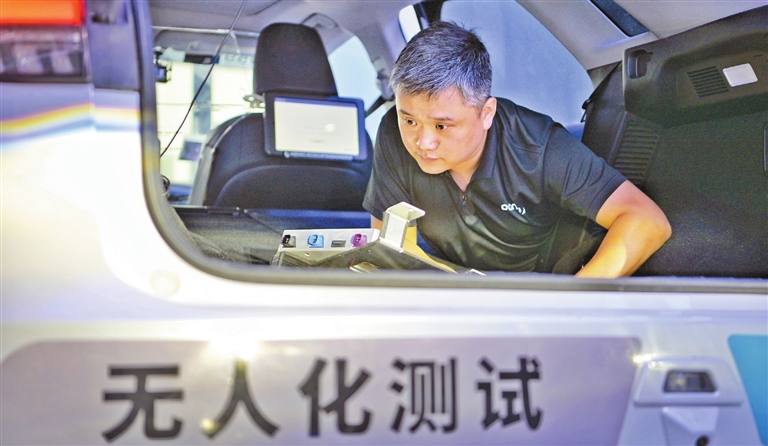
ABOUT two decades ago, Wang Wei, then a fresh university graduate, joined a manufacturing company in the city of Zhuhai, Guangdong Province, that specialized in circuit board welding. After getting married, Wang moved to Bejing in 2010 to be closer to his hometown in North China’s Hebei Province. There, he found a welding job in a drone company. In 2019, as internet companies, car manufacturers, and a large number of startups invested in the research and development and testing of autonomous vehicles, Wang got a job at Pony.ai, an autonomous driving service provider. Working in the operations center as a smart-vehicle maintenance technician, he was tasked with the assembly, monitoring, operation, and maintenance of devices installed in intelligent connected vehicles. China’s digital industry has seen robust growth in recent years as it embarks on a tech-driven development path, generating new professions that not only help expand employment but also contribute to high-quality development in emerging sectors like artificial intelligence (AI). At the end of July, 19 new professions, including Wang’s, were added to China’s list of officially recognized occupations. Over half of these new professions involve digital and smart technologies, according to the Ministry of Human Resources and Social Security. Included are operators of generative AI systems, smart vehicle testers, and industrial internet maintenance staff. Data show that the added value of the digital economy’s core industries accounted for 10% of China’s GDP in 2023. With the wide application of AI technology, Zhong Jinyu, who previously worked in customer service, opted for a new position in his company — generative AI system operator. The company, NeuroBot, is an industrial AI vision platform provider of industrial vision functions based on deep learning technology, including defect detection, size measurement, and target positioning. Now, Zhong’s job is to feed the company’s large model with data collected from the company and its customers, train it repeatedly, and then feed the AI-generated content back to customers. “The new profession requires us to enhance our ability to learn new technologies quickly so we remain competitive in the intelligent society of the future,” Zhong said. A survey by online recruitment platform Lagou shows that the AI sector ranks among the top three job creators in the country. Furthermore, it was one of the most popular fields among Chinese university graduates this year. Li Qiang, executive vice president of online job-seeking platform Zhaopin, said that the emergence of new professions represents the development direction of new technologies and new industries, which requires practitioners to have the ability to continuously learn and innovate. The constant upgrading of China’s digital industry has brought Wang more room for career development. He said that his next “small goal” is to become a smart vehicle tester, a position that requires a higher level of software skills. “New problems may come at any time, and I can learn a lot in my work,” said Wang. (Xinhua) | 
